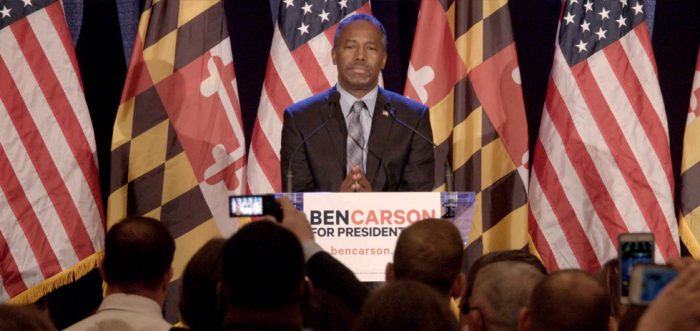![]()
I can’t even begin to speculate on how history will remember Dr. Ben Carson, but I do know one thing: he will not be remembered as President of the United States. But there was a time early in the Republican primaries when it didn’t seem like such an absurd notion; he was mentioned in the same breath as Donald Trump, beneficiary of the same populist wave that rejected establishment candidates on both sides of the aisle and promised to rejuvenate an ailing American nation.
Of course, it didn’t pan out that way. Luke Walker’s documentary PACmen tries to unpick precisely why, by focusing on the decidedly unglamorous world of political action committees, and their steroidal derivative the SuperPAC. A brief primer: SuperPACs are nominally independent bodies who conduct fundraising and campaigning on behalf of candidates and are not beholden to the kind of financial restrictions that the candidates themselves are.
They are – of course – a cancer on America’s body politic, and one of the most malignant conduits through which America’s monied establishment flexes control over the system at large. Documentarians have rarely had this kind of access behind the scenes at a SuperPAC, but the fact Walker has been granted this insight seems mostly due to the staggering incompetence of everyone in Carson’s orbit rather than any particular cunning on his part.
The film posits a fundamentally interesting question: how exactly did the deeply corrupted instruments of American democracy attempt to propel such a profoundly unqualified candidate into the presidency? (Of course, there’s a wistfulness to this, given that someone far more demented ended up in the halls of power anyway, but it seems unfair to deduct points for that.) The problem is that the grand potential of the film is somewhat squandered by its glacial pace, muddled narrative, and generally confused understanding as to what exactly about Carson and his campaign was so interesting. His followers, who we are introduced to mostly through vignettes of town hall meetings, phone banking setups and prayer circles, seem like prototypical Trump voters who haven’t quite realised it yet. They’re disparate remnants of Jerry Falwell’s Moral Majority, evangelicals who lack the blue collar bona fides to get New York Times profiles but nonetheless yearn for an America which is dead and buried.
Carson himself, though, is the living manifestation of the great, universal maxim of Stay In Your Lane – a man prodigiously talented in one field (neurosurgery) but decidedly lacking in others (politics, policy, history, basic material truths). He lacks Trump’s swagger, too. So when the jackals in the media uncovered some of his more unusual past statements – such as his utterly baffling claim that the Great Pyramids were built to store grain – he was unable to defend himself without looking like an even bigger buffoon. There are some early scenes in which Carson’s chaotic candidacy is contrasted with the extremely low-rent biopic about his life, Gifted Hands, in which the good doctor is played by Cuba Gooding Jr. It’s a funny insight into the very, very American mode of mythmaking which finds its zenith in the presidential campaign.
The arc of the film follows the slow-fast-slow decay of Carson’s campaign. As his media gaffes become more and more pronounced, big donors who really had no reason to donate to him in the first place fall away, and general support among a population hungry for change atrophies. But the central remit of the film – to explore the behind-the-scenes machinations of a SuperPAC, feels unfulfilled. You could walk out of this imagining that a SuperPAC works like any other U.S. political campaign. Likewise, a person who reads horror stories about the SuperPAC system won’t see much of those big, dark narratives reflected here. That’s not necessarily a bad thing, of course. But when a film is pitched as a pulling back of the curtain, it’s unfortunate when all that’s behind it are a couple of crusty mops and a bucket.
There is one moment in the film which felt like the thematic core of a different and much better film. One of Carson’s SuperPAC hatchet men stands in front of a room of true believers and outlines the arc of Carson’s presidential ambition – from his dressing down of Barack Obama at the National Prayer Breakfast to… well, that’s it, really. It becomes painfully obvious in this brief but telling moment that one 27-minute speech in 2013 railing against political correctness and calling for moral regeneration was the foundation upon which an entire big money campaign was built. There’s a feeling of the air being sucked out of the room as the hollowness of the entire enterprise, and the sheer, obvious inadequacy of its chosen candidate, is laid bare. In that moment, the possibility of PACmen is realised, but the film rarely hits those notes again.
